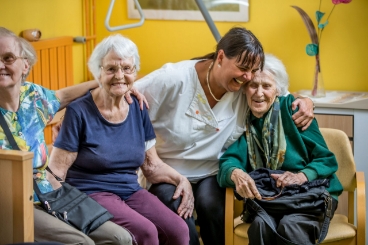
Caretaker vs Caregiver: Key Differences and Responsibilities
Sep 15, 2024
Introduction to the Roles of Caretaker vs Caregiver
The terms "caretaker" and "caregiver" are often used interchangeably, but they represent distinct roles with unique responsibilities. Understanding the differences between these two roles is crucial, especially if you’re in the process of hiring help for a loved one or managing a property. While both caretakers and caregivers provide essential services, their primary focus and duties can differ significantly.
In this article, we’ll explore the responsibilities and qualifications of caretakers and caregivers, how to determine which one is right for your needs, and when to hire each. We’ll also dive into the financial, ethical, and legal aspects of hiring these professionals.
Definitions: What is a Caretaker?
The role of a caretaker is traditionally more aligned with the management and maintenance of physical properties or environments. They ensure that everything is functioning correctly, often dealing with repairs, upkeep, and sometimes security.
Traditional Role of a Caretaker
Caretakers typically work in settings such as residential buildings, vacation homes, parks, or schools. They are responsible for maintaining the premises, ensuring cleanliness, and handling minor repairs. In some cases, caretakers also look after animals or oversee gardens and grounds, making their role broad and multifaceted.
Job Responsibilities of a Caretaker
Caretakers may have duties like:
- Performing minor repairs or hiring contractors for larger maintenance work.
- Cleaning and organizing spaces.
- Ensuring safety and security of the premises.
- Handling administrative tasks such as keeping records or managing budgets related to maintenance.
Definitions: What is a Caregiver?
On the other hand, a caregiver is someone who provides direct care and assistance to individuals, especially those who are elderly, disabled, or chronically ill. Unlike caretakers, whose focus is more on property and physical surroundings, caregivers deal with people and their personal needs.
Traditional Role of a Caregiver
Caregivers are responsible for ensuring the well-being of individuals by assisting with daily activities like bathing, dressing, eating, and medication management. They also provide emotional support, fostering a compassionate and empathetic environment for those they care for.
Job Responsibilities of a Caregiver
Caregivers often have the following responsibilities:
- Assisting with personal hygiene tasks.
- Administering medication and managing medical appointments.
- Providing companionship and emotional support.
- Helping with meal preparation and daily household chores.
Key Differences Between Caretaker and Caregiver
While both roles involve care, their areas of focus differ.
Types of Care They Provide
- Caretakers: Focus on maintaining properties, ensuring physical spaces are well-kept, and sometimes managing the security of a location.
- Caregivers: Provide personal and medical care, focusing on the health and well-being of individuals who may need assistance with daily living activities.
Focus on Health vs. Maintenance
The primary difference lies in health vs. maintenance. Caregivers focus on the health, comfort, and emotional well-being of people, while caretakers focus on the upkeep and functionality of physical spaces.
When to Hire a Caretaker?
Situations Where a Caretaker is Needed
You might need a caretaker if you own a large property, have a vacation home that requires regular maintenance, or if you're managing a commercial building. Caretakers ensure that these spaces remain in excellent condition, handling everything from basic repairs to security.
Hiring Tips for Finding a Good Caretaker
When hiring a caretaker, look for someone with experience in property management, the ability to perform basic repairs, and a trustworthy demeanor. It's essential to conduct background checks and ask for references to ensure the person is reliable and responsible.
When to Hire a Caregiver?
Situations Where a Caregiver is Needed
Caregivers are essential when a loved one requires personal care, either due to aging, a chronic illness, or disability. They provide day-to-day assistance, helping individuals maintain a good quality of life despite their health challenges.
How to Choose the Right Caregiver for Loved Ones
When selecting a caregiver, look for:
- Experience in personal or medical care.
- Compassionate and empathetic nature.
- Ability to manage the specific health needs of your loved one.
- Certification or training in caregiving, especially for medical tasks.
Legal and Ethical Considerations
Contractual Obligations for Caretakers and Caregivers
Hiring either a caretaker or caregiver requires a legal agreement. Ensure that all responsibilities, hours of work, and payment terms are clearly outlined in a contract. This protects both you and the person you hire from potential misunderstandings.
Ethical Issues Surrounding Caregiving
Caregivers, in particular, are often privy to intimate details of a person’s life and health. It’s essential to hire someone with a strong ethical compass, as they will be responsible for handling private matters with discretion.
Emotional Support Provided by Caregivers and Caretakers
The Role of Compassion and Empathy
While caretakers offer peace of mind by maintaining a functional living environment, caregivers provide much-needed emotional support. They build close bonds with those they care for, providing not only physical care but also companionship.
Financial Aspects of Hiring a Caretaker vs Caregiver
Budgeting for Care Services
The costs of hiring a caretaker vs. caregiver can vary widely based on location, the level of care required, and the person’s experience. Generally, caretakers tend to cost less than caregivers, especially if the caregiver is providing medical services.
Conclusion
In summary, while both caretakers and caregivers offer essential services, their roles and responsibilities differ significantly. Understanding these differences will help you choose the right person for your needs, whether you're looking for property maintenance or personal care.
FAQs
- What are the main differences between a caretaker and a caregiver?
The primary difference is that caretakers focus on maintaining properties, while caregivers provide personal care to individuals. - Can a person act as both a caretaker and a caregiver?
In some cases, yes. However, their responsibilities will typically lean more toward one area, depending on the needs of the situation. - What qualifications should I look for in a caregiver?
Look for certifications in caregiving, experience in medical care, and a compassionate demeanor. - What are the typical costs of hiring a caretaker or caregiver?
Caretakers generally charge less than caregivers, especially if the caregiver provides specialized medical services. - How do I know if my loved one needs a caretaker or a caregiver?
If the primary need is property management, hire a caretaker. If your loved one needs personal or medical care, a caregiver is the better choice. - What legal protections do I have when hiring a caretaker or caregiver?
Ensure you have a contract outlining the duties, hours, and payment. This protects both parties and ensures clarity on the job expectations.
